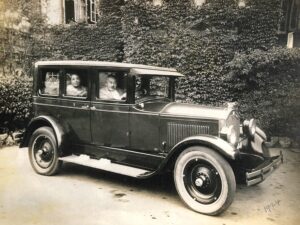
For me this started as an attempt to get to know my great grandfather, who is long dead before I was born. He was an interesting character, with an interesting background, who somehow managed to make something big for himself and his immediate family. In the course of finding out things about one’s past, you hope that something interesting will emerge. In my case, my great-grandfather was the interesting fulcrum upon which the rest of the family enjoyed a comfortable life. Embedded in the story is a lot of history.
My mother’s side of the family is part Chinese, with their roots in Shanghai, China, and caught up in the tumultuous events of the second world war, where they were thrown into a concentration camp for 4 to 5 years. That part is a story documented by Steven Spielberg and his movie ‘Empire of the Sun‘, a fascinating look back using the actual backdrop of Shanghai for the footage. This was before progress has been made and all the buildings changed. His timing was excellentFor me, as a writer, what comes to mind is the difficulties in writing true history, truthful facts about one’s family history, and really what is the fundamental point of the documentation?
Am I attempting to accurately depict what happened, even if it was boring and uneventful? Or am I trying to create a fictional narrative that would be of interest to a third-party reader, in addition to holding some historical value, especially with regards to the old photographs that are included? This is the question, and it is a tough one to answer.
History is relegated to the past. Its function for the future is a sort of guide map that might help in some decision making, avoiding mistakes people of made before you, learning from things that worked or did not work. However a book about history, or historical events is, in my mind, best served in a form that is interesting; not necessarily accurate.
SOMETIMES A LIE MAKES A BETTER TRUTH
I was told a story about to aunts of my grandmother. The year was 1912. I was young at the time, one before the internet allowed for an instant search. My grandmother told me that the two aunts, one she was names after, died in a boating accident.
I was impressed. To die in a boating accident was a big deal. At the time, in school, we had covered the big accident of 1912. There was only one big accident of that year: THE TITANIC!
I got excited. My grand-aunts died in the Titanic? Waaaay cool! But I had no way to verify this.
It sat on the back burner for years. A decade later as the internet emerged, I could scan the list of Titanic passengers. Nope. Odd. I asked my grandmother again, now a decade older, a mere year from her death. And again she stated that it was a boating accident in 1912. That is all she knew.
Years passed–as did my grandmother–and I now found the eldest survivor of her siblings. I met with her and recorded our talk. At the end I brought up the accident, asking if she knew they were on the Titanic? My grand-aunt laughed. “Titanic?” She laughed. “They were on a rowboat on a lake and neither could swim and the boat capsized and they drowned.”
WHAT???? How demoralizing.
And at that moment I realized that my family story was best served by the dramatic drowning of two grand-aunts aboard the Titanic. Anything else was a waste of a good story.
And THAT is my point. It is called FICTION for a reason. You are ENTERTAINING a reader. So do it the best way you can, because facts are just a pesky wall that can slow your story down.
Now, you may be shocked. Truth is, after all, ‘the truth!’ But it is not. In life, history is always written by the winner, not the loser. And history has been rewritten countless times to offer a vibrant account of what may not have been very exciting. We accept that.
When we read autobiographies, or biographies, we are seeking the essence of truth, although we read verbatim dialog that, in all likelihood, ever happened. This merely adds to the truth, adds to the story, strengthens the narrative. It makes us feel good.
But that is humanity. Makeup covers wrinkles and blemishes. We disguise truth to project the best of facades. Sean Connery, bald and older, donned wigs for his roles that allowed the projection of strength and vigor. This helped sell the role.
Yes, your mother always told you to tell the truth. But the truth rarely helps you. Confession may be good for the soul, but it rarely helps you out.
In writing, your job is not to divulge the truth, even when it is the pursuit of the character. Your job is to use the truth to make your story better, no matter how you do so.
The best lie is a solid truth wrapped in a greasy blanket. Do with that what you will.
